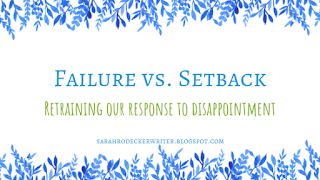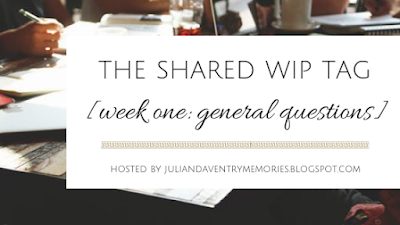Failure vs. Setbacks
Well, I'm back (ish). I meant to return last week, but it seemed like I needed an extra week off before I dove back into the world of blogging.
This week's post is one that I started a while ago, but never quite had the words to say on it. I kept pulling it up, kept wanting to write it, but never knew just how to do so. But I'm going to give it a go today and see what I discover.
I once read an article about how one deals with failure (I think it's been several years since I read this article, so I don't remember where I read it).
I realized that most of the people there had a misconception of failure. We use this word interchangeably with setbacks to the point where we believe they're synonymous. They're not.
Let's look at the meanings of these two words. Both definitions come from the Webster's II New Riverside Dictionary.
Fail- To prove so deficient as to be totally ineffective. To be unsuccessful.
Setback- An unanticipated delay or reverse in progress.
Not the same thing. But so many people use the word failure with setback's definition. This, I think, causes us to give up on things when really we should strive to press through.
What's a disappointment you've encountered recently? A rejection? Taking longer on a draft than you expected? Feedback that stung a bit? Or something completely not writing related at all?
Now, take whatever it is and compare it to the definitions above.
Let's say it was a rejection. Is a rejection something "so deficient as to be totally ineffective?"
You probably said "no, of course not". Getting rejected doesn't end our writing career or anything else for that matter. And they're not ineffective. Rejections serve a purpose. An opportunity for growth. They're not a failure.
Now, is a rejection "an unanticipated delay or reverse in progress?" Yes, one could say it is. While we understand rejection is a possibility, we send out proposals and queries with the hope of getting published. Getting a rejection is a delay or reverse in our progress. It is a setback.
Now, how does knowing the difference between the two help us in every day life?
Knowing that something is a setback and not a failure is encouraging. It gives us focus and purpose. Instead of thinking there is no point in continuing, we realize that we simply have to take a different path than what we originally expected.
A failure signals the end of something. There's nowhere to go from there.
So, the next time you're tempted to say "such-and-such is a failure", I encourage you to take a moment and really analyze if it is, in fact, a failure. Chances are, it'll actually be a setback and that means you can go somewhere with it!
 |
| From Giphy |
Now onto y'all! What's a setback you've experience recently (bonus points if you can give me a non-writing related one!)? What are you learning about it? What steps are you taking to overcome it?




Awesome post, Sarah! A setback is not the end. Not even close. And it's not a failure. Thanks for the reminder!!
ReplyDeleteAbsolutely! It's been a mindshift change for me. I'm used to treating everything like a failure, even when they're not. It's been really great to see them like they are: just setbacks.
DeleteI really need to start seeing things as setbacks. I always get dramatic and say I fail at everything.
ReplyDeleteSAME, girl! Same.
Delete